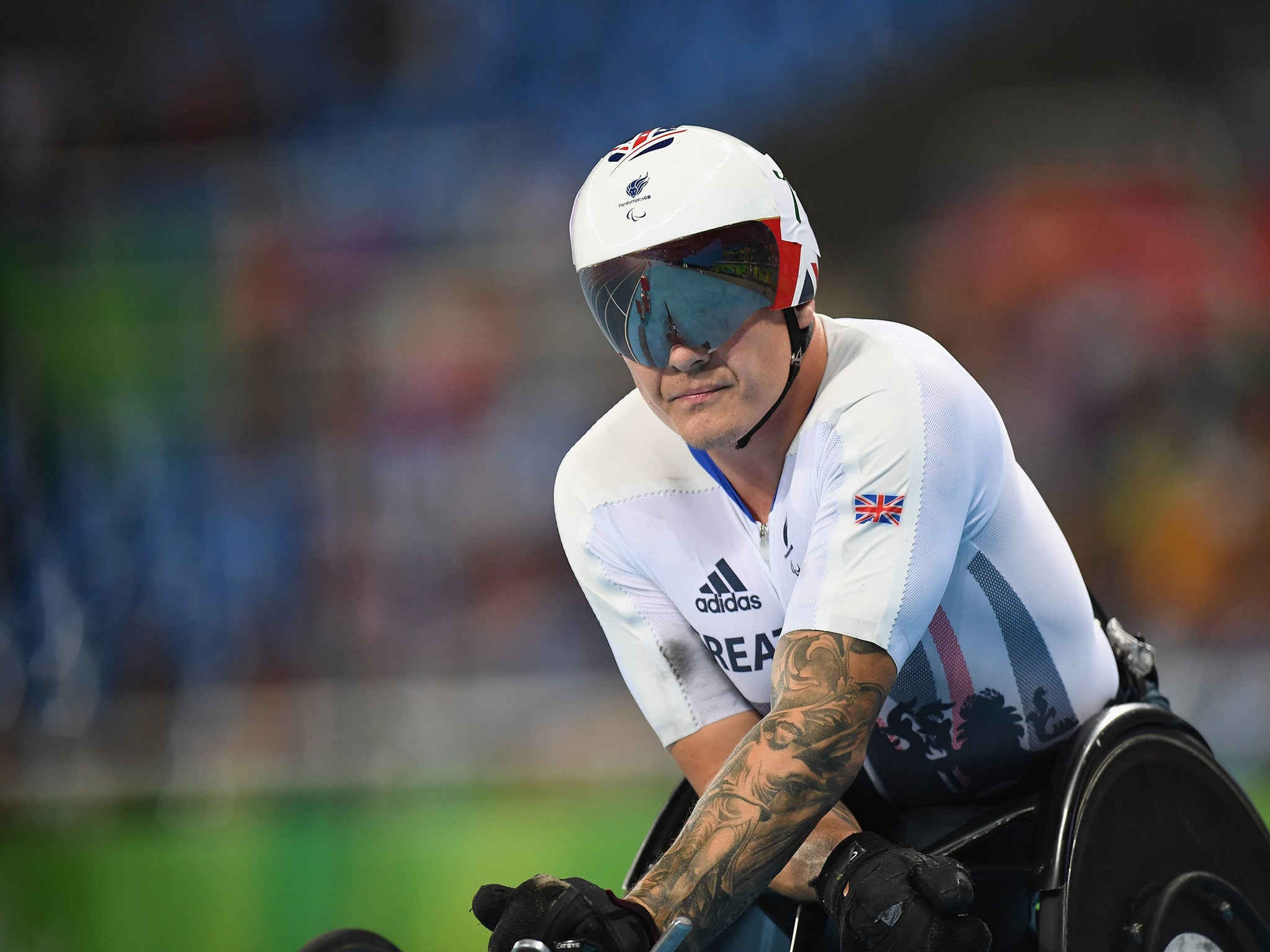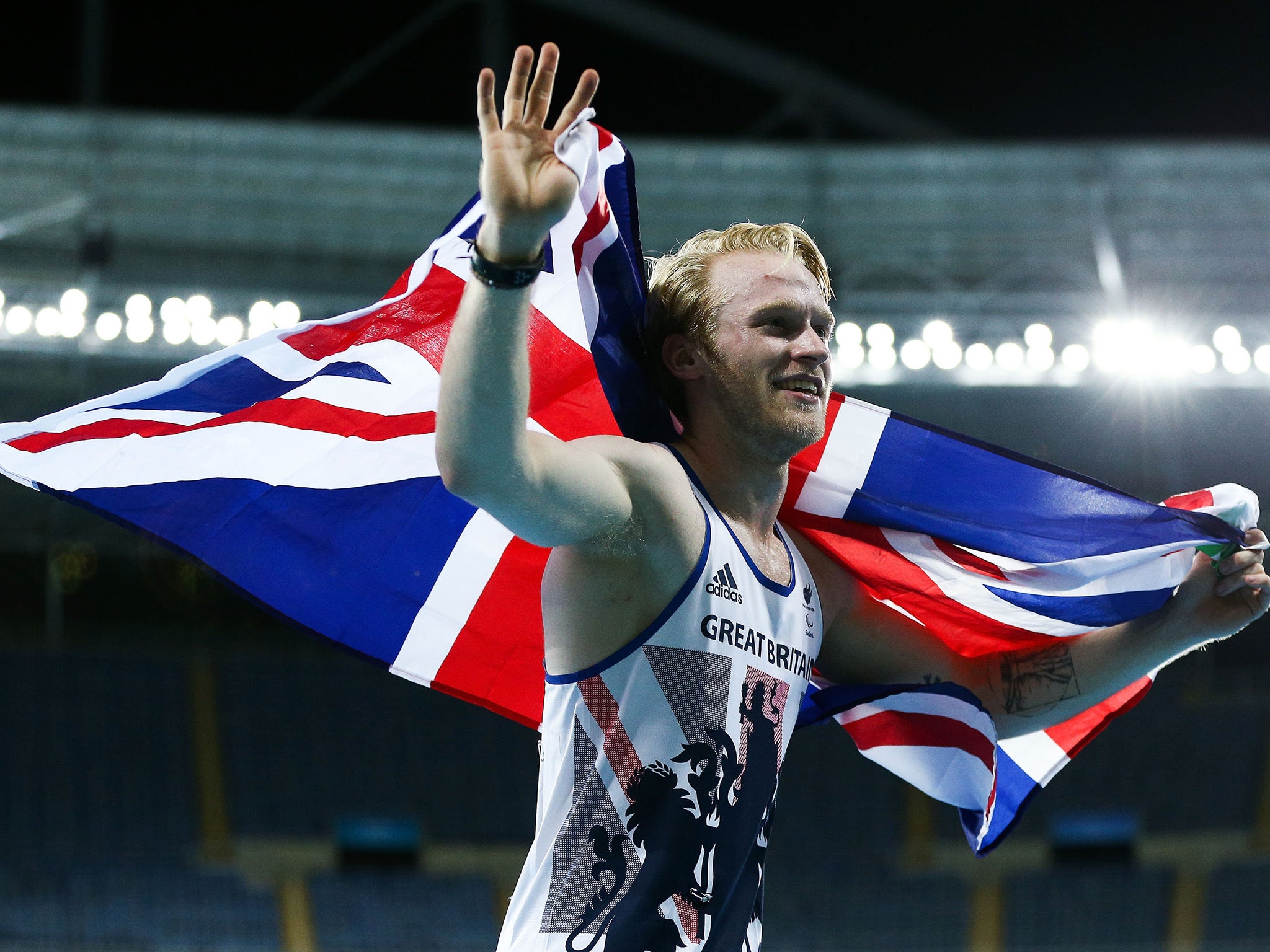The mental health of Britain's best loved Paralympians is under strain
The World Para Athletics Championships open in Stratford this Friday, but one hero of London 2012 will not be there having refused to take part

ParalympicsGB’s best-loved athletes have been cresting a seemingly endless wave since London 2012, but the golden generation’s mental health has suffered beneath appearances.
The World Para Athletics Championships that open in Stratford this Friday have attracted more ticket sales than all previous editions combined. However London 2012 hero David Weir, the home star of the greatest show in the history of the Paralympic movement, will not be there having refused to take part. The quadruple gold medallist of five years ago pushed his chair from the London Stadium’s red track for the last time on Sunday. It followed victory in a hastily arranged goodbye race against makeweights who typically compete below his level.
If ever there was a premature retirement this was it, but Weir suffered a breakdown earlier this year, one that had been brewing for a while. Physically Weir is as powerful as ever – he won the London Marathon for a record seventh time in April – but mentally the sport has left him broken and his family fraught with concern for his welfare.
I was in training for the London Marathon, but there were times when I would forget to eat for a few days.
Things have come to a head over the last 12 months. The 38-year-old missed the birth of his youngest child to compete at the Rio Games but came home empty handed. He’d never known the feeling of “letting down” his country before. There were expletives on live television and a public fall out with GB coach Jenny Banks, who accused him of “sabotaging” a British relay.
Weir has lived with depression since as far back as 2009, weighed down by assumptions that he would retain his two Beijng titles from the previous year. “I handled it pretty well ahead of London 2012,” Weir tells The Independent, giving himself precious little credit for doubling his gold tally. “But then after that with every championship people expected me to win six, seven, eight, nine… even ten medals. It was too much and it really got to me.”
Worn down and isolated, Weir wrote a goodbye note to his children on New Year’s Day and drove across the UK, through the night, to seek solace from his father in North Ireland. His wife raised the alarm, unsure where he was headed or if she would see him again. The police tracked him down on the M6 motorway to assess whether he needed to be sectioned for his own safety. “I really wasn’t myself,” Weir said later. “I couldn’t talk properly. I was stuttering. My speech was slow. I was twitchy. I was in training for the London Marathon, but there were times when I would forget to eat for a few days.”
Depression manifests itself differently in different people, but difficulties sleeping, eating and talking fluently are known to be common characteristics. Weir begun counselling this year, talking therapy which, he says remains “ongoing”. “We’ll see where it takes me but I’d encourage anyone with mental issues to talk to people because it helps.”
Weir’s immediate future entails training his academy of young athletes and he’s determined to equip them with coping skills that enable them to enjoy their careers in ways he did not. Weir is not alone in wrestling expectations, although some shield it better than others. Jonnie Peacock and Hannah Cockcroft are known for their upbeat on-screen personalities but both have had their dark days since 2012.

“Everyone copes differently but I am a perfectionist in myself too,” Peacock, poster boy of the blue riband 100 metres, says. “David’s event is probably one of the most competitive events in the Paralympics and my event is definitely up there too. Everyone has their own demons to fight with and I guess sometimes people forget that there’s a human being behind the athlete.”
Athlete welfare has come under the spotlight in Olympic sports such as cycling and swimming recently but a win-at-all-costs mentality has developed in British para-sport too. Perhaps we’ve been spoiled by the exploits of the golden generation. “I definitely think the media can underestimate the emotional pressure athletes are under,” Peacock adds. “But it’s not their job to worry about that, it’s their job to ask questions and its athletes’ jobs to throw the furthest or run the fastest. You can’t take your eye off the ball even for a second.”
Peacock is eagerly anticipating performing on home soil again on Sunday night, but he admits to being close to mental saturation after having to peak for a Paralympics and a home world championships within 10 months of one another. “We put on great shows in London but, after this, I’m maybe going to just tick over for the next year. I need to rest my mind… to not have to have the mental pressure of having something big to achieve for one year.”

Wheelchair racer Hannah Cockroft will share top billing with Peacock over the next fortnight after taking home more golds than any other Brit at last year’s Rio Games. “For so long I’ve had comments that it’s so easy, that I’ve no competition, that there’s no challenge there. Actually there’s not been a challenge there because I’ve put the work in,” the 24-year-old says.
Cockcroft says she is spurred on by the numbness that accompanies failure. Britain came second in the medal tables of both the Olympics and Paralympics last year. She now performs in a climate where British success is as expected as it is celebrated.
“I got beaten for the first time three weeks before the last world championships, in 2015. “It destroyed me; it absolutely destroyed me. I didn’t know how to handle it.” Cockcroft says she now gives herself no option other than to succeed. “That was like my wake-up call – you’re not head and shoulders above everyone else anymore, you’re not miles ahead anymore. You have to train the best to be the best.”
Dr Steve Peters is a psychiatrist who helps elite athletes cope with expectations and win while maintaining emotional equilibrium. Peters has documented his approach to supporting clients, advising athletes to identify what they define as success and then assess whether their values are helpful or detrimental. “The brain needs maintenance,” he says. “The task is to work out for yourself what you define as success and then ask whether your ideas are acceptable or detrimental.”
Weir will continue his counselling treatment over the next fortnight while Cockroft and Peacock continue their pursuit of medals. It’s tougher at the top than sometimes acknowledged and Weir’s story reminds us that not all that glitters is necessarily gold.
Join our commenting forum
Join thought-provoking conversations, follow other Independent readers and see their replies
Comments
Bookmark popover
Removed from bookmarks